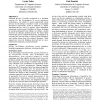Free Online Productivity Tools
i2Speak
i2Symbol
i2OCR
iTex2Img
iWeb2Print
iWeb2Shot
i2Type
iPdf2Split
iPdf2Merge
i2Bopomofo
i2Arabic
i2Style
i2Image
i2PDF
iLatex2Rtf
Sci2ools
CHI
2003
ACM
2003
ACM
Unpacking "privacy" for a networked world
Although privacy is broadly recognized as a dominant concern for the development of novel interactive technologies, our ability to reason analytically about privacy in real settings is limited. A lack of conceptual interpretive frameworks makes it difficult to unpack interrelated privacy issues in settings where information technology is also present. Building on theory developed by social psychologist Irwin Altman, we outline a model of privacy as a dynamic, dialectic process. We discuss three tensions that govern interpersonal privacy management in everyday life, and use these to explore select technology case studies drawn from the research literature. These suggest new ways for thinking about privacy in sociotechnical environments as a practical matter. Keywords Privacy, surveillance, monitoring, access regulation, boundary management, disclosure, social psychology
CHI 2003 | Human Computer Interaction | Interpersonal Privacy Management | Interrelated Privacy Issues | Keywords Privacy |
| Added | 01 Dec 2009 |
| Updated | 01 Dec 2009 |
| Type | Conference |
| Year | 2003 |
| Where | CHI |
| Authors | Leysia Palen, Paul Dourish |
Comments (0)

